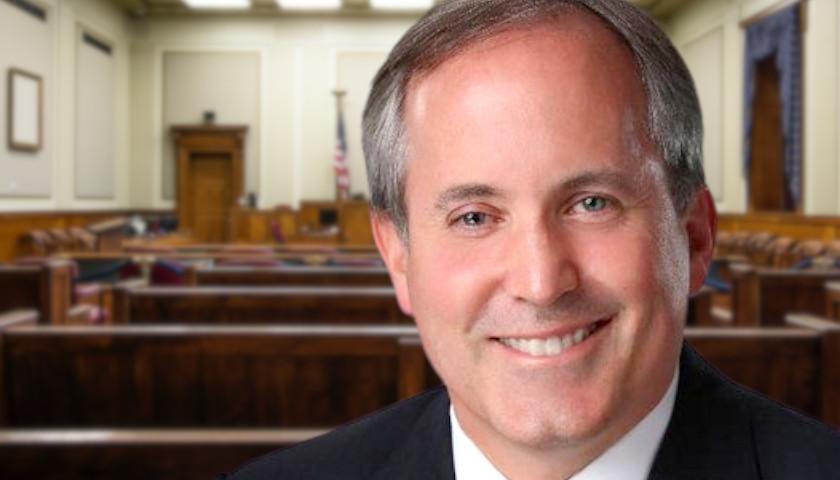The Texas Supreme Court issued a ruling on Wednesday dismissing the State Bar of Texas’s (SBT) four-year-long attempt to discipline Texas Attorney General Ken Paxton’s First Assistant Attorney General Brent Webster, calling it an “egregious invasion of the attorney general’s authority.” Webster assisted Paxton with combating election wrongdoing in the 2020 election, which included filing the lawsuit Texas v. Pennsylvania over the election irregularities in four states in 2020, which was joined by 21 other states.
Paxton (pictured above), who is facing similar charges from the SBT, posted on X, “After four years of lawfare and political retaliation, the Texas Supreme Court has ended this witch hunt against the leadership of my office. The Texas State Bar attempted to punish us for fighting to secure our national elections, but we did not and will not ever back down from doing what is right. We have seen this playbook used against President Trump and other effective fighters for the American people and I am pleased that this attempt to stop our work has been defeated.”
After four years of lawfare and political retaliation, the Texas Supreme Court has ended this witch hunt against the leadership of my office.
The Texas State Bar attempted to punish us for fighting to secure our national elections, but we did not and will not ever back down… pic.twitter.com/Bbfn4C9cbA
— Attorney General Ken Paxton (@KenPaxtonTX) December 31, 2024
Webster said in a statement, “The actions of the State Bar were disgraceful, ridiculous, and a disservice to the people of Texas. Thankfully, with President Trump back in the White House and these attempts to wage legal warfare against us defeated, we can finally get back to making Texas and America great again without distraction.”
In September 2022, a trial court judge sided with Webster, dismissing the charges brought by the SBT’s Commission for Lawyer Discipline, but the SBT appealed to the Texas Court of Appeals, which reversed the district court. Brewster then appealed to the Texas Supreme Court. Oral arguments took place last September. A national coalition of 18 state attorneys general filed an amicus curiae brief with the court in April, urging the court to dismiss the charges against Webster.
Seven justices exonerated Webster, with only two justices dissenting. The 49-page opinion, authored by Justice Evan Young, found that “the commission’s case is nonjusticiable under the separation-of-powers doctrine” and “reinstate[d] the trial court’s judgment dismissing the case for lack of subject-matter jurisdiction.”
The court noted that the legal theories of the Texas v. Pennsylvania lawsuit were never decided on the merits since a majority on the Supreme Court dismissed the complaint for lack of standing. The court observed that two justices dissented, since they would have not have dismissed the complaint.
The opinion also noted that people filed bar complaints with no connection to the case.
“Among the grievances was Brynne VanHettinga’s. VanHettinga does not reside in Texas, is an inactive member of the State Bar of Texas, and has no connection to the underlying litigation. Nevertheless, she faulted the first assistant for making ‘specious legal arguments and unsupported factual assertions’ in the initial pleadings,” the opinion said.
VanHettinga’s complaint would go nowhere if filed today, the court said, since the Texas Legislature changed the law after it was filed only to allow bar complaints that have “a cognizable individual interest in or connection to the legal matter or facts alleged in the grievance.”
The justices also pointed out that when the complaint was first received, the Office of the Chief Disciplinary Counsel initially dismissed it for not alleging professional misconduct. VanHettinga appealed the dismissal, and the Board of Disciplinary Appeals reversed the dismissal.
Webster was accused of six “misrepresentations,” “false statements,” and “representations [that] were dishonest” in the lawsuit. The commission stated that his claims were not “supported by any charge, indictment, judicial finding, and/or credible or admissible evidence.”
The first alleged misrepresentation was asserting that unregistered voters changed the election results. The second was that a voting machine glitch changed votes. The third alleged misrepresentation stated that “[s]tate actors unconstitutionally revised their state’s election statutes.” The fourth was that illegal votes affected the outcome. The fifth accusation was his assertion that “Texas had uncovered substantial evidence that raised serious doubts about the integrity of the election process in the defendant States.” Finally, he was faulted for believing Texas had standing.
The justices pointed out that the Supreme Court did not refer him nor any other attorney for discipline, nor did any party to the case complain.
The justices examined the limited powers of the commission under the judiciary. Since the commission was created under the Texas court system, “any exercise of power that would have been improper or unauthorized for this Court to undertake before the commission’s creation would necessarily be improper and unauthorized for the commission to undertake now.”
The opinion went over the broad powers the Texas Constitution delegated to the attorney general. The justices said it wasn’t even a close call whether the commission under the judicial branch or the attorney general had more authority.
“[T]he commission claims authority for the judicial branch that the judiciary lacks: a free-ranging power to second-guess the attorney general’s and his first assistant’s exercise of discretion in making initial filings that is wholly divorced from and collateral to the litigation in which those filings are made,” the opinion said.
The court added, “[T]he attorney general’s determinations about whether a lawsuit and its constituent parts are ‘supported by any charge, indictment, judicial finding, and/or credible or admissible evidence’ are entrusted to the attorney general — not the commission.” Citing case law, the court criticized the commission. “The commission here, like the superintendent in Marrs, seeks ‘to determine whether or not suits shall be brought’… and more, it attempts to second-guess the attorney general’s judgment and discretion in populating the suit with the representations that gave it force.”
The opinion denounced the commission’s actions. “[T]he commission threatens the attorney general’s ability to run his office and therefore represent the State in civil litigation altogether. … [The move] represents an especially egregious invasion of the attorney general’s authority.”
The court said there wasn’t a single previous instance of the commission disciplining a public attorney for the same ethics violations. “This lack of precedent strikes us as unsurprising because the primary way to address alleged violations of disciplinary (and other) rules in initial pleadings is our system’s normal way — to take it up with the court to whom the pleadings are presented,” the justices said.
The opinion went on, “If there were an established practice of subjecting public lawyers — and especially state attorneys general — to catch-all provisions like Rule 8.04(a)(3) for alleged misrepresentations in initial pleadings, we would expect a host of authorities rather than the silence that we instead find. That silence reflects the judiciary’s duty to refuse invitations to interfere with coordinate-branch decisions that are ultimately political. The commission’s approach risks allowing the judiciary to be commandeered by adversaries — political or otherwise — who wish to leverage the disciplinary process in service of deeply felt views of policy or politics that are best addressed outside the disciplinary process.”
Citing precedent, the court said the commission was improperly engaging in political disputes, “Collaterally disciplining an official like the first assistant for statements made in initial pleadings — particularly when a filing involves a politically sensitive lawsuit — creates a serious risk that the judicial branch will venture into, or be dragged into, the contentious arena of political disputes. This Court has time and again refused to do so.”
The court delved into a frequent criticism of state bar rules that they are broad and vague. The justices said accusations of “lack of straightforwardness” or “integrity in principle” are “comparatively vague compared to other disciplinary rules.”
The justices concluded, “This Court, moreover, will remain the final check if courts improperly impose or, in egregious cases, refuse to impose discipline. … The judicial branch, and this Court, remain fully capable of redressing whatever concerns may arise that would otherwise threaten the independence, integrity, or impartiality of the judiciary.”
Paxton previously filed briefs urging to convert the bar into a voluntary organization. Texas Bar Sunset, a legal integrity organization seeking to make the bar voluntary, lists multiple ways to reform the SBT. In Arizona, after the Arizona Supreme Court held that election attorneys could not be disciplined for bringing election challenges, the State Bar of Arizona’s disciplinary judge ruled that she would not discipline Kari Lake’s attorneys, Kurt Olsen and Andrew Parker, citing the court’s decision.
– – –
Rachel Alexander is a reporter at The Arizona Sun Times and The Star News Network. Follow Rachel on Twitter / X. Email tips to [email protected].





